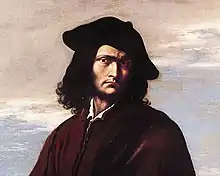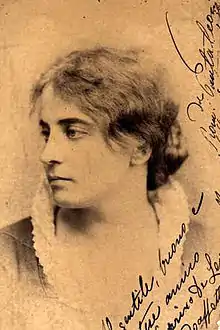| Salvator Rosa | |
|---|---|
| Opera seria by Antônio Carlos Gomes | |
_-_Archivio_Storico_Ricordi_FOTO000918.jpg.webp) Antônio Carlos Gomes in 1889 | |
| Librettist | Antonio Ghislanzoni |
| Language | Italian |
| Based on | Eugène de Mirecourt's Masaniello |
| Premiere | |
Salvator Rosa is an opera seria in four acts composed by Antônio Carlos Gomes to a libretto in Italian by Antonio Ghislanzoni. It premiered at the Teatro Carlo Felice in Genoa on 21 March 1874. The plot is based on Eugène de Mirecourt's 1851 adventure novel, Masaniello, in turn loosely based on the lives of the Italian painter and poet, Salvator Rosa and Masaniello, a Neapolitan fisherman, who became leader of the 1647 revolt against the Spanish Habsburg rule in Naples.
Background and performance history

Salvator Rosa was Gomes' fifth opera and the third to have its world premiere in Italy. He and his librettist, Ghislanzoni, had originally wanted to call the opera Masaniello, after Eugène de Mirecourt's novel on which it is based. However, Auber's 1828, La muette de Portici set in the same historical period, was already known in Italy by that name. Instead, Ghislanzoni made Salvator Rosa (a secondary character in de Mirecourt's novel) the chief protagonist. The central love affair between Isabella and Masaniello in the novel became one between Salvator Rosa and Isabella in the opera. Like many fictional works based on the life of Salvator Rosa, de Mirecourt's novel derived from an 1824 biography of the painter by Lady Morgan, The Life and Times of Salvator Rosa, which perpetuated the legends that Rosa had been imprisoned by bandits when he was a young man and that he returned to Naples in 1647 to aid Masaniello in his revolt against Spanish rule.[1] It is the latter legend which forms the basis of Ghislanzoni's libretto.
Salvator Rosa premiered at the Teatro Carlo Felice on 21 March 1874 in a performance conducted by Giovanni Rossi with Guglielmo Anastasi in the title role, Leone Giraldoni as Masaniello, Romilda Pantaleoni as Isabella, and the French bass François-Marcel Junca as her father, the Duke of Arcos.[2] Following the Genoa premiere, the opera was performed in Italy at the Teatro Regio (Turin) (1875), the Teatro Riccardi in Bergamo (1876), and the Teatro Regio (Parma) (1882). In South America, it was first performed in Uruguay at the Teatro Solis in 1876, but it was another six years before the opera was performed in Brazil, Gomes' native country. The Brazilian premiere took place in the city of Belém on 29 July 1882. Although largely forgotten now apart from its great aria for bass, "Di sposo, di padre", the opera's rare 20th century revivals include those in Rio de Janeiro at the Theatro Municipal in 1946 (attended by Gomes' daughter and broadcast on Brazilian radio), São Paulo at the Theatro Municipal in 1977, and at New York City's Amato Opera in 1987.[3] The opera was revived again in 2000 with the Dorset Opera, Fernando del Valle in the title role, and 2004 at the Festival della Valle d'Itria in Martina Franca.[4]
Roles

| Role | Voice type | Premiere cast, 21 March 1874[2] |
|---|---|---|
| Il duca d'Arcos, Viceroy of Naples | bass | François-Marcel Junca |
| Isabella, his daughter | soprano | Romilda Pantaleoni |
| Salvator Rosa, a painter in love with Isabella | tenor | Guglielmo Anastasi |
| Masaniello, rebel leader and friend of Rosa | baritone | Leone Giraldoni |
| Gennariello, a young friend of Rosa and Masaniello | soprano (en travesti) | Clelia Blenio |
| Fernandez, commander of the Spanish troops | tenor | Giacomo Origo |
| Il conte di Badajoz, a Spanish nobleman | tenor | Carlo Casarini |
| Corcelli, a brigand allied to the Spanish rulers | bass | Emanuele Dall'Aglio |
| Bianca, a Spanish lady | mezzo-soprano | Antonietta Pozzoni-Anastasi |
| Suora Ines, a nun | soprano | Clelia Cappelli [5] |
| Fra Lorenzo, a monk | bass | Luigi Torre |
Recordings
- "Mia piccirella", aria from Salvator Rosa, sung by Enrico Caruso and recorded in 1919. Label: Victor[6]
- Gomes: Salvator Rosa – Michail Milanov (Il Duca d'Arcos), Lisa Livingston (Isabella), Fernando del Valle (Salvator Rosa), Michael Gluecksmann (Masaniello); Dorset Opera Orchestra and Chorus; Patrick Shelley, conductor. Recorded from live performances at Sherborne School, Dorset, England, August 11 and 12, 2000. Label: Regis Records[7]
- Gomes: Salvator Rosa – Francesco Ellero D’Artegna (Il Duca d'Arcos), Francesca Scaini (Isabella), Mauro Pagano (Salvator Rosa), Gianfranco Cappelluti (Masaniello); Italian International Orchestra; Bratislava Chamber Chorus; Maurizio Benini, conductor. Recorded live at the Ducal Palace, Martina Franca, Italy, July 2004. Label: Dynamic
- Gomes: Salvator Rosa – Dae-Bum Lee (Il Duca d'Arcos), Maria Porubcinova (Isabella), Ray M. Wade, Jr. (Salvator Rosa), Malte Roesner (Masaniello); Staatsorchester Braunschweig; Braunschweig State Theatre Chorus; Georg Menskes, conductor. Recorded live at the Staatstheater Braunschweig, Germany on January 20, 2010. Label: Oehms Classics in co-production with NDR Kultur and the Braunschweig State Theatre
References
Notes
- ↑ Patty 2005, p. 101 and passim.
- 1 2 Casaglia 2005
- ↑ Kimmelman 1987.
- ↑ Kirk n.d.
- ↑ Although the roles of Bianca and Suora Ines were sung by two different singers at the premiere (see Casaglia 2005), the libretto states that they can also be sung by one singer
- ↑ Discography of American Historical Recordings. "Victor matrix C-23150. Mia piccirella / Enrico Caruso". University of California Santa Barbara Library. Retrieved 9 June 2019
- ↑ Review: Salvator Rosa, Dorset Opera recording, musicweb-international.com
Sources
- Casaglia, Gherardo (2005)."Salvator Rosa, 21 March 1874". L'Almanacco di Gherardo Casaglia (in Italian).
- Kimmelman, Michael (15 May 1987). "Opera: Salvator Rosa". The New York Times. Retrieved 30 October 2010.
- Kirk, David L. (n.d.). "Recording review: Salvator Rosa". Fanfare. Retrieved 30 October 2010 – via arkivmusic.com.
- Patty, James S. (2005). Salvator Rosa in French Literature: From the Bizarre to the Sublime. University Press of Kentucky. ISBN 0-8131-2330-5.
Further reading
- Béhague, Gerard (1992), "Salvator Rosa" in The New Grove Dictionary of Opera, ed. Stanley Sadie (London) ISBN 0-333-73432-7
- Salgado, Susana, The Teatro Solís: 150 years of opera, concert, and ballet in Montevideo, Wesleyan University Press, 2003. ISBN 0-8195-6594-6
External links
- Complete libretto published by Casa Ricordi in the original Italian
- Salvator Rosa (Gomes): Scores at the International Music Score Library Project
- Detailed synopsis by Cyrene Paparotti